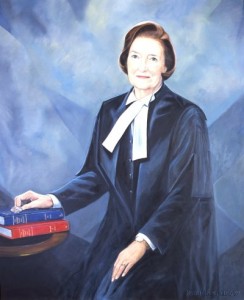by Janine Benedet, CFLS Director

‘Portrait of the Honourable Bertha Wilson,’ 1999, by Mary Lennox Hourd.
It was in 1990 that Justice Bertha Wilson gave her now-famous speech at Osgoode Hall Law School entitled, “Will Women Judges Really Make a Difference?” Having recently stepped down as the first woman judge on the Supreme Court, she considered whether women’s ascent to the judiciary had influenced the development of the common law and the shaping of the Charter. She answered this question in the affirmative, influenced in particular by her decision in R. v. Lavallee, in which the Supreme Court held that the law of self-defence should reflect the reality of battered women’s lives. She was later joined on the Supreme Court by Claire L’Heureux-Dube who openly confronted rape myths and sex discrimination in family law, among other areas of particular concern to women. Justice Wilson went on to Chair a very important CBA task force on gender equality whose 1993 report noted the hostility faced by women judges who were labeled feminists by their male colleagues.
Recently, UBC Law was honoured by the visit of Justice Marie Deschamps as this year’s Donald J. Mawhinney lecturer in ethics and professionalism. Justice Deschamps recently retired from the Supreme Court of Canada. She was replaced by Justice Richard Wagner, reducing the number of women on the court to three (Chief Justice McLachlin and Justices Abella and Karakatsanis). In a recent interview, she lamented the fact that she had not been replaced by another woman, noting that “I was sad that I was not replaced by a woman. We are looked at not just as a model for the courts in Canada, but around the world – and I think it’s very important that the Supreme Court of Canada remains a model.”
Of course the Supreme Court of Canada is not the only court where sex equality has recently been eroded. In British Columbia, between January 2009 and December 2012, 28 of the 33 appointees to the British Columbia Supreme Court were men. No women were appointed at all in 2011 and 2012. The B.C. advisory committee to the Minister on judicial appointments (as listed online) is also all-male. Three decades of slow but steady progress threaten to be wiped out as a generation of trail-blazing women nears retirement age.
Those of us committed to sex equality in law and in the legal profession must resist this disturbing trend. There is a tendency to forget the efforts that were required to achieve past progress and that resistance to such progress has not disappeared. We need to mentor and encourage each other to seek entry to the highest reaches of the profession and to demand change to the structures of those institutions if they exclude women. We should not allow ourselves to be brushed off with the claim that no women are applying to be judges any more than we should content ourselves with the dismissive supposition that women do not want to be law firm partners. I am not ready to hear the speech, “Why did Women Judges Cease to Be?”
This piece first appeared in LawFemme, Vol. 12, Issue 1, under the title “Message from the Director”.


